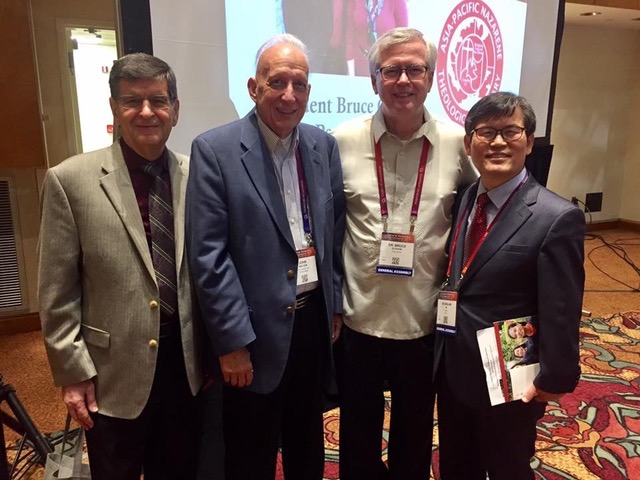Values Underlying
Church of the Nazarene
College, University and Seminary
Faith Communities
Affirmation #2
As I mentioned in the previous blog post, I have been asking myself throughout the past few years some fundamental questions about our Nazarene colleges and universities: (1) What drives or motivates our colleges and universities as Christian institutions of higher education? (2) What characterizes us at our best and convicts us at our worst? (3) What shapes the lifestyle – the words, action, and behavior – of our campuses as faith communities? (4) What is foundational to our conviction that God calls all believers to a life of holiness? (5) What are the values for which we stand?
I began to answer these questions in the previous blog. Affirmation #1 (above) briefly developed the thought that “WE LOVE GOD. Therefore, we value and stand for:
1. A Worshiping Community
2. A Biblical Faith
3. A Christlike Lifestyle
4. A Holiness Ethic
5. A Global Mission
6. A Creation Vision
7. A Spirit-Empowered Devotion

Affirmation #2 is this: WE RESPECT OTHERS. Therefore, we value and stand for…
1. A Magnanimous Spirit
Spirit-filled Christians on our campuses are big-spirited. They give others the benefit of the doubt. They recognize that mistakes can be made, even by themselves. They believe the best, not the worst, in others. They want others to succeed, not fail. They are happy when others receive attention, awards, and accolades. They don’t “put people down” in order to build themselves up, or have a healthy self image. They freely forgive, even before forgiveness is asked
Jesus taught us an unforgettable lesson about forgiveness. He said, “Father, forgive them, they know not what they do.” It’s ironic. His “enemies” had not asked for forgiveness, nor did their behavior toward Jesus change when Jesus extended forgiveness to them. What difference, then, did forgiveness make? Not in outward circumstances, for sure. They continued to kill Him. However, His words of forgiveness made all the difference inwardly. He would not permit what others said or what they did to create anger, resentment, and bitterness within Him. His relationship to the Father was so much more important. Others’ behavior toward Him would not be permitted to rupture the relationship with the Father. “Father, forgive them, they know not what they do.” A magnanimous, forgiving spirit. And this must be our spirit.
2. A Servant Mentality
Christians embracing the lifestyle of holiness are challenged on our campuses to find tangible, concrete ways to serve others in Jesus’ name and say to fellow believers within the fellowship, “I love you. I care for you. You are my brother or sister in Christ.”
In its briefest and most general understanding, ministry is service to others in Jesus’ name. Certain words help us understand the various dimensions of Christian ministry – words like caring, sharing, growing, relating, teaching, and confronting. Ministry in New Testament perspective takes the form of holding the hand of a person engulfed in fear, listening intently to a person in trouble, crying with a person who is hurt, or embracing the individual who is grieving. It may include taking friends to the store for groceries, sharing your talents with others, or confronting in love the lack of discipline or careless habits. Ministry encompasses the sharing of the Christian faith or a verse of scripture with another in time of need.
Christian ministry is the extension of Jesus in our world, incarnating the healing, guiding, sustaining, reconciling work of Jesus in the lives of those with whom we work and live. If you are a Christian, you are called to Christian ministry. Mount Vernon Nazarene University’s motto is: To seek to learn is to seek to serve. A servant mentality is in the DNA of our Nazarene institutions.
Ministry understood in this broadest sense is the context for our specific ministry. We may be specifically called and gifted for pastoral ministry, teaching ministry, evangelism ministry, music ministry, or leadership ministry. But it is futile and self-defeating to seek to function within our particular calling while ignoring the broader calling to serve others in Jesus’ name.
3. A Trustworthy Character
“Character is what you are,” someone said, “when no one is looking at you.” Character is the sum total of our values, priorities, commitments, and decisions. Increasingly, spirit-filled Christians develop a Christlike character as they grow and mature in Christ.
Ephesians 4:25 exhorts us not to lie. “Put off falsehood” one translation states. The specific reference is to “speaking the truth” within the body of Christ, the fellowship of believers. But do Christians lie to one another?
I choose to believe that we don’t lie to one another on purpose. Christians do, however, sometimes ignore other believers with whom their differences have created barriers. Conversation is therefore superficial. Discussion, if any, focuses on everything but the issue dividing the Christians. Is this lying?
Increasingly, our word must become our bond. What people “see” is what they should “get.” Our lives should assume an authentic, transparent, and genuine nature. Our character is trustworthy, even in the academic arena. The school’s code of academic integrity affirms the commitment to truthfulness in the exams taken on campus and the assignments submitted to teachers. Academic integrity is an essential component of Nazarene colleges, universities and seminaries.
Administrators and faculty members want students on our campuses to see us as honest, not just with facts, dates, and figures, but with our emotions – particularly negative emotions that tend to divide and separate the Christian fellowship.
4. A Positive Influence
Have you ever been around someone that, when you left their presence, you felt about three inches tall? Some people act as if the only way to build themselves up is to put other people down.
Likewise, you have been around other people that, when you left their presence, you felt big, strong, and confident. You believed that with God and you, you could make a difference, overcome the obstacle, or succeed where you had failed
“Do not let any unwholesome talk come out of your mouths, but only what is helpful to others, that it may benefit those who listen.” This admonition in Ephesians 4:29 puts most of us under conviction. Our words tend to be self-serving rather than for others.
Sanctified Christians increasingly make a positive rather than a negative difference in the people with whom they as yourself is this: “Do people with whom I associate feel better or worse about themselves, their work, their denomination, their college, university and seminary life, and God as a result of my involvement with them?”
Mature Christians on our campuses focus on building up others who are less mature in their faith, not tearing them down; on encouragement, not discouragement; on supporting, not undermining; on healing, not hurting; on caring, not indifference; on others, not on ourselves. Our influence is positive, not negative.
5. A Courteous Response
The way of holiness is a path whereby committed Christians “are being renewed in the attitude of their minds.” For sure, this is true on our campuses.The Ephesians 4:23 passage is given in the context of a contrast between ways Christians and non-Christians live their lives and respond to others.
Attitudes of the heart that should increasingly characterize Spirit-filled Christians include the following:
I love you – you are my brother/sister in Christ;
I need you – you have strengths and gifts I do not have;
I accept you – you are being changed by Christ as I am being changed;
I respect you – you are different, yet we are one in Christ;
I trust you – you desire to serve the same Christ as I;
I serve you – I want to minister grace to you.
These attitudes of the heart enable us to respond courteously to others, even on a Nazarene campus when others do not reflect the same attitudes and behavior towards us. “Be kind to one another, tenderhearted, forgiving one another, even as God for Christ’s sake hath forgiven you” (Ephesians 4:32).
6. A Giving Motivation
We have heard throughout our lives the biblical reference, “it is more blessed to give than to receive” (Acts 20:35). And the usual context in which we focus this admonition is in reference to money.
Money, for sure, must be included in the discussion. Another equally strong biblical principle states, “to whom much is given, much is required” (Luke 12:48 b). But “giving” on the Nazarene campuses for most of us, if it relates only to money, permits us to get off the hook and allows us to miss the principle. A commodity just as rare as money on campus is time. And the giving of our time is included in the biblical injunction.
Time is needed to greet students on campus, to get acquainted with them, assist them in adjusting to a new, if not strange, environment, bring them into our friendship loop, invite them to walk with us to class, to chapel, to coffee. Returning students remember their first days on campus. Anxiety. Fear. Homesickness. Perceived lack of freedom. A sense of being an outsider and even rejected. Much pain.
Nazarene campus communities are encourages to find someone who is new to campus and spend some time with them. It is right and it should be done. It is something you students, faculty and administration can give, often, to others!

Their first language of some new students may be a language different from first language of the returning students. New students whose language and culture is different from the returning students need friends, others to help them. Ask them (and others) these questions:
1. How are you doing?
2. How are you coming along with…(a specific problem, project, etc.)?
3. How can I help you in…? (Be as specific as possible.)
“Christ died while we were yet sinners.” We did not deserve the gift of eternal life He gave to us. Look around, often, and see people in need of something you can give. You give, like Christ, not because the other person “deserves” the gift necessarily, but because you desire to love others as Christ loved us.
7. An Appreciative Attitude
The contemporary song asks the question, “How can I say thanks for the things You have done for me – things so undeserved … the voices of a thousand angels cannot express my gratitude. All that I am, or ever hope to be, I owe it all to You.” The refrain of the song continues with thanksgiving to God for all that He has done.
Holiness people are grateful people. Grateful to God, through His unmerited grace, for saving, sanctifying, and establishing them firmly in the way of holiness. A spirit of thanksgiving must be the continuous response of the committed Christian to the goodness of God in his/her life.
Yet, our expressions of appreciation should extend to others who help us along the journey. This includes other students, roommates, teachers, and … yes, even administrators!
Song writer and musician Ray Boltz was on campus of Mount Vernon Nazarene University several years ago for a concert. During the concert, he shared the background for writing one of his top hits at that time. He wrote the song for Pastor’s Appreciation Day in his local church. The heart of the song expresses gratitude to his pastor. “Thank you for giving to the Lord, I’m a life that’s been changed…Jesus took the gift you gave. That’s why I’m here today.”
In addition to expressing praise and thanksgiving to God, find another person, daily, to whom you can say – honestly and genuinely –
I thank you.
I’m grateful to you.
I appreciate you.
And be as specific as you can in expressing your gratitude to the other person. You may have to look hard each day for someone to whom you can express gratitude. But keep looking…you will find someone.
The Swedish family therapist, Swen Walroos, in his outstanding text, Family Communication, concluded from his extensive work with troubled families that the ratio of criticism to compliments in dysfunctional families was 7 or 8 to 1; that is, there were seven or eight criticisms to every one compliment. He states, “My goal in family therapy is to reverse the ratio; that is, to help families give seven to eight compliments to every one criticism.”
I’m concerned when the pervasive mood or conversation of a campus, dorm, a “clique” or group, a family, or an individual is overwhelmingly negative. Something is fundamentally wrong with that individual, group, or institution. Usually we can find what we look for if we’re looking for the negative in others or in this institution. Likewise, if you focus on the positive in others or in this institution, you will find it
And when you find it…discipline yourself to express appreciation. Develop an appreciative attitude. It is healthy for you physically, emotionally, and spiritually. Find someone each day to whom you can say…
I thank you.
I’m grateful to you.
I appreciate you.







